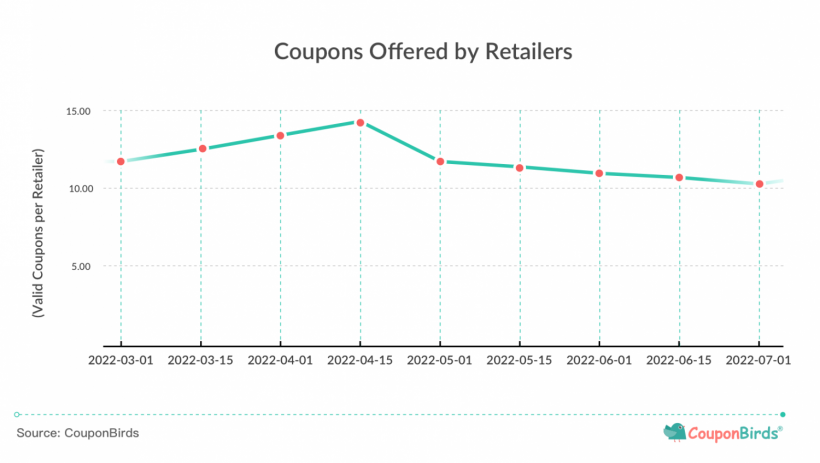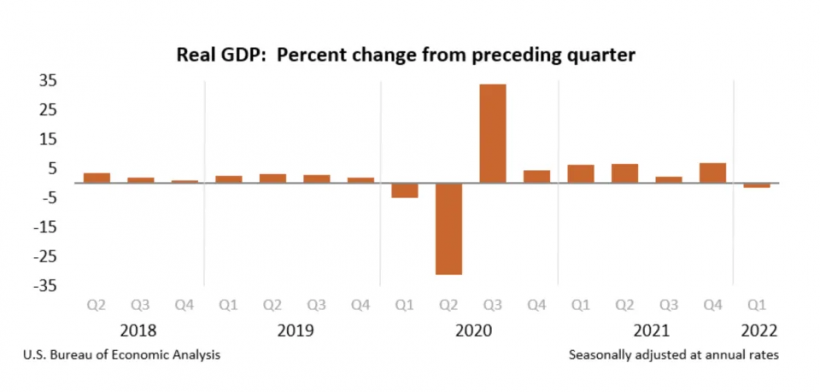Inflation hit a 40-year high and has not gone unnoticed by everyday Americans. The US consumer price index (CPI) rose 1% in May from the previous month and 8.6% from a year earlier.
And the U.S. economy shrank at an annual pace of 1.6% in the first quarter, reflecting a deeper contraction than previously reported, according to the third and final revision issued by the Bureau of Economic Analysis.
The decline is in sharp contrast to the 6.9% increase in the fourth quarter of 2021. The downgrade came as corporate profits fell more than initially expected.
Walmart and Target are some of the biggest retailers in the US whose profits are dragged down by inflation this year.
In its first quarter of 2022, Walmart reported its revenue of $141.57 billion, up 2.4% year-on-year and beating market expectations of $138.94 billion. The net income of Walmart was $2.05 billion, down 25 percent from a year earlier. A sharp rise in fuel prices, rising labor costs, and aggressive inventory levels have weighed on profits. Therefore, Walmart raised its sales outlook for fiscal 2023 but cut its profit forecast.
On May 18, one of the biggest department stores, Target announced results for the first quarter of 2022. Its total revenue for the first quarter was $25.17 billion, up 4% from a year earlier. Net profit was $1.09 billion, down 51.9 percent year-on-year. The company missed its targets because its earnings were accompanied by unusually high costs. Fuel and freight costs are now $1 billion higher than expected this year, with little relief in sight throughout 2022.
Although the revenue of retailers continues to increase thanks to inflation and rising prices, their earnings are missing. Therefore, some retailers cut their discounts to make their profits back to the pre-pandemic level.
According to Spendmenot, almost 90% of consumers used coupons in 2020. Over 142 million US adults redeemed digital coupons in 2020 and there are 145.3 million consumers using coupons by 2021.
However, the number of coupons distributed by retailers is declining despite the increasing number of coupon users. Total coupon distribution dropped 15% to 200.13 billion in 2020. The downtrend is accelerating as coupon statistics for 2019 show distribution fell 12% to 235.46 billion the previous year.
Besides, the number of digital coupons is also falling in 2022. According to CouponBirds, a well-known coupon site, the number of coupon codes offered by 1,000 top retailers are declining since May 2022. In March 2022, each retailer offered nearly 13 coupon codes on average, and it still continued to grow in April. However, the number of coupon codes began to decrease in May and continued in June and July with only about 10 coupons offered by each retailer. In addition, the total number of coupons provided by retailers in June 2022 decreased by 32.9% compared with the same period last year. It can also be predicted from the chart that retailers' coupons will keep declining in the next few months.

The decreasing coupon codes reflect retailers are shrinking their discounts to get more profit. Among the 1,000 retailers, 20% are grocery stores and restaurants. As the rising food price has hit a history record, food-related merchants are the ones who face the greatest burden. Retailers that sell shoes, clothing, or other accessories are the second which are cutting their discounts for customers mainly because of the higher prices for materials and surging delivery costs. The third is the hotel, museum, zoo, and other sites that sell tickets. The soaring gas price makes those merchants adjust their discount policy.
Since retailers are seeking ways to boost sales and profits to fight inflation and there are probably no more huge discounts for consumers, you shall work on your wallet. Here are some tips to help consumers budget and save money during inflation.
-
Examine your spending now. The first place that inflation will impact your bottom line is with your budget. Food, gas, travel, and other daily necessities are the main cost for every family. You should plan a new budget strategy since the prices of those goods and services are already rising at a steep rate. For example, if you trim the entertainment or travel budgets by five to 10 percent, you will save extra money and ease your burden when you are facing the rising cost about everywhere.
-
Buy in bulk or buy with friends and family. If you really need something, don't hesitate to buy it, because the price will likely rise. What you shall keep in mind is that it's actually a smart move to buy in bulk. Typically, you'll pay less per item. Besides, if you don't need to stock up, you could always split your shopping haul with a friend or family member.
-
Keep investing wisely. Cash isn't king during periods of high inflation. You don't need too much cash to fight inflation, and you'd better set some far-off goals like buying a home or planning for your retirement. Therefore, investing in stocks or other financial products under the guidance of a professional consultant will help you win the highest potential long-term returns.
-
Buy reusable instead of disposable. Buying reusable products often costs more upfront than buying disposable counterparts. However, reusable products are more cost-effective than disposable ones because they can be used for a much longer period of time. A $10 product that you can use over and over again is evidently better than a $5 product that will be thrown away after one-time use.
-
Shop strategically. Buy generic brands, search for coupons and use cashback apps to lower your cost. Don't forget your credit card which can help you get money back when you are spending your money. Make purchases on a card that offers a statement credit, travel points, or other rewards every time you swipe. And you can also use the memberships in different stores to help you save money on products or gas.
-
Reduce your subscriptions. If you have subscribed to many services or bought cable TV packages during the pandemic, rethink if they are necessary and cancel everything you don't need to use or care about right now.
Inflation is putting huge pressure on retailers to cope with the soaring prices. Higher costs for gasoline, food, and other essentials are making consumers more price-sensitive. However, price is not the only concern. Consumers shall be more sensitive about changes in the retail market and the adjustments retailers will do to fight inflation. Besides, consumers shall plan earlier to stretch their budget and increase their ability to manage the risk.
* This is a contributed article and this content does not necessarily represent the views of sciencetimes.com












!['Cosmic Glitch' in Einstein's Theory of General Relativity Could Be Explained in This New Scientific Tweak [Study]](https://1721181113.rsc.cdn77.org/data/thumbs/full/53435/258/146/50/40/cosmic-glitch-in-einsteins-theory-of-general-relativity-could-be-explained-in-this-new-scientific-tweak-study.jpeg)


